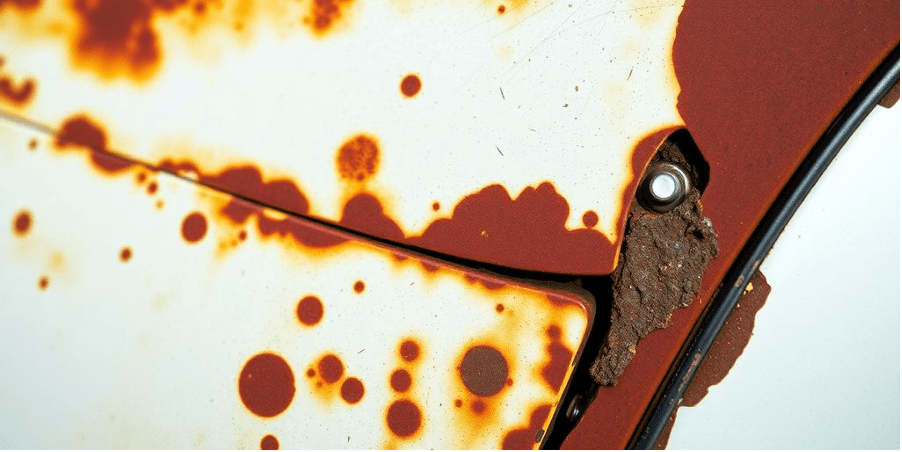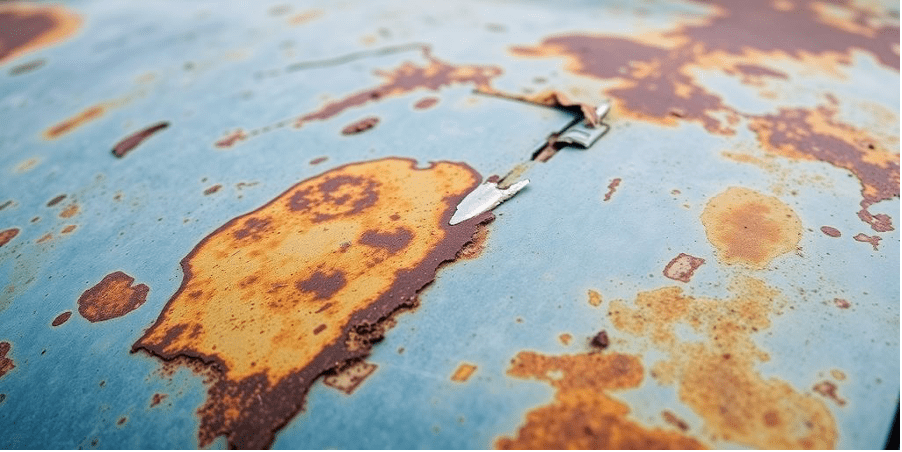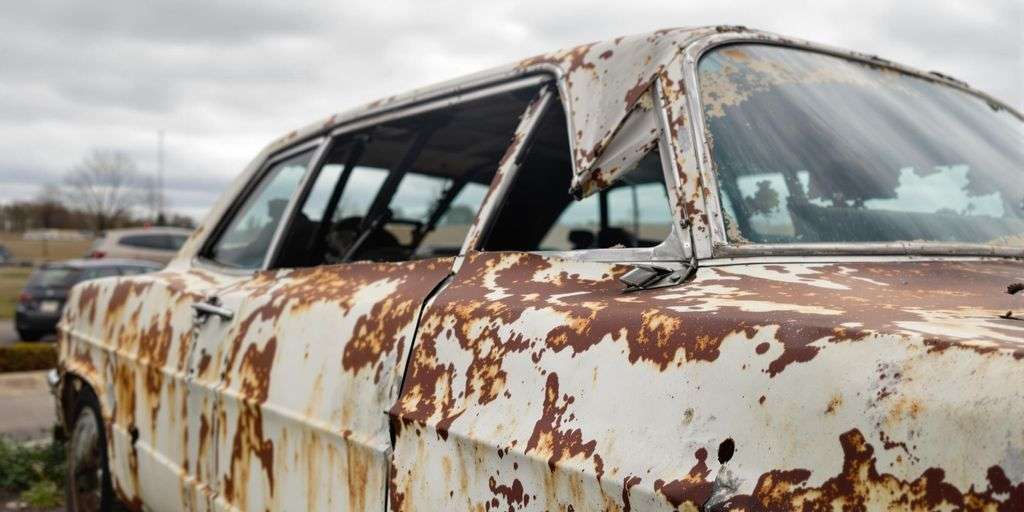Key Takeaways
- Rust can drop a car's value by 10-20%, or more if it's really bad.
- Surface rust is less of a hit to value than structural rust.
- Fixing rust sooner rather than later can save on bigger costs and keep value up.
- Regular checks and maintenance can prevent rust from becoming a problem.
- Selling a rust-damaged car might mean accepting a lower price or looking at other selling options.
Understanding the Impact of Rust on Car Value
Factors That Influence Rust Damage
Rust can really mess with your car's value, and it's not just about how bad it looks. Things like where you live, how often you drive, and even how you park can make a big difference. For example, living in a humid area or near the ocean can speed up rusting. Also, if you don't wash your car regularly, especially in winter when there's salt on the roads, rust can start forming faster. So, keeping an eye on these factors can help manage rust.
How Rust Affects Resale Value
When it comes to selling your car, rust can be a real deal-breaker. Rust can chop off anywhere from 10% to 20% of your car's resale value. If it's just minor surface rust, you might get away with a smaller hit, but if it's structural, like on the frame or chassis, you’re looking at a bigger loss. Buyers see rust as a sign of neglect and potential future problems, so it's always a good idea to address it before putting your car on the market.
The Role of Rust in Trade-In Evaluations
Dealerships are quick to spot rust during trade-in evaluations, and they won't hesitate to knock down the offer price. They know rust can mean costly repairs, so they factor that into the trade-in value. If rust is found on critical parts like the undercarriage or suspension, expect a lower offer. To get the best deal, consider getting a professional appraisal for rust damage and addressing any issues beforehand. This can help you negotiate better with the dealer.
Assessing the Severity of Rust Damage
Identifying Surface Rust vs. Structural Rust
Rust on a car can be a sneaky problem. At first, it might just look like a few red spots on the surface, but if you ignore it, it can get serious. Surface rust is usually just cosmetic. It's that flaky stuff you see on the body panels, and it doesn’t typically affect how your car runs. You can often handle it with some sanding and a bit of paint. But, when rust gets deeper, it can turn into structural rust. This is the kind that eats away at the car’s frame and chassis. If it gets bad enough, it can mess with your car’s safety and performance.
Evaluating Rust in Critical Areas
When you're checking for rust, there are some places you really need to pay attention to. The undercarriage and suspension are big ones. Rust here can mess with how your car handles and could even cause you to fail a vehicle inspection. Also, look at the frame and chassis. Rust in these areas can mean big trouble because it can weaken the whole structure of the car. And don't forget about the mechanical parts—rust there might not be common, but it can lead to expensive repairs if it happens.
Professional Appraisal for Rust Damage
If you're not sure how bad the rust is, it might be a good idea to get a professional to take a look. A professional appraisal can give you a clear picture of how much the rust is affecting your car's value. Some services even offer free valuations, so you know what you're dealing with before you decide to sell or fix your car. They can tell you if it's just surface rust or if it's something more serious that could affect the car’s roadworthiness. Plus, they can help you figure out if fixing the rust is worth it or if you might be better off looking at other options.
Cost Implications of Rust Repair

Estimating Repair Costs for Different Rust Types
When it comes to repairing rust on a car, the costs can vary quite a bit depending on the severity and location of the rust. Minor surface rust is the least expensive to fix, often costing between $100 and $300. This type of rust is usually just on the surface and doesn't affect the car's structure. For more moderate rust damage, where larger areas are affected or the rust is in critical spots, repair costs can jump to between $400 and $1,000. This often involves sanding, repainting, and resealing, and sometimes even replacing panels. If you're dealing with extensive rust that has caused structural damage, expect to pay at least $1,000. In some cases, your insurance might even write off the car if the damage is too severe.
DIY vs. Professional Rust Removal
Deciding between tackling rust removal yourself or hiring a professional depends on the extent of the rust and your comfort level with car repairs. DIY kits are available and can be effective for minor surface rust. They typically include rust converters and sealants. However, for anything beyond surface rust, it's usually best to consult a professional. Pros have the tools and expertise to handle more severe rust and ensure that the repair is done correctly. Plus, professional repairs often come with a warranty, giving you peace of mind.
Long-Term Financial Benefits of Rust Repair
Investing in rust repair is not just about fixing the immediate problem. It's a long-term investment in your car's value and safety. A car that's free of rust is more appealing to buyers and can fetch a higher resale price. Moreover, addressing rust issues early can prevent more serious damage down the line, saving you from costly repairs in the future.
Rust might seem like a small issue at first, but if left unchecked, it can lead to major problems. Taking care of rust as soon as it appears can save you a lot of money and hassle in the long run.
For more insights on the financial impact of rust repair, you might find the CCC's Crash Course Q4 2024 report useful, as it discusses rising repair costs and changing customer expectations in the auto industry.
Preventing Rust to Maintain Car Value
Regular Maintenance Tips
Keeping your car rust-free is a bit like taking care of your teeth—regular attention can save you from a lot of pain later. Routine maintenance is your first line of defense against rust.
- Wash and Wax Regularly: Just like dirt and grime can lead to cavities, they can also lead to rust. Wash your car often, especially after driving on salted roads in winter. A good wax job acts like a protective sealant.
- Check for Rust Spots: Make it a habit to inspect your car for any signs of rust. Catching it early can prevent it from spreading.
- Keep It Dry: Moisture is rust's best friend. Try to park in a garage or use a car cover to keep your vehicle dry, especially during wet seasons.
Taking these simple steps not only keeps your car looking good but also helps maintain its value over time.
Effective Rust-Proofing Techniques
Rust-proofing isn't just for older cars; even newer models can benefit from it. Here are some methods to consider:
- Undercoating: This involves spraying a protective layer on the undercarriage of your car. It's especially useful if you live in areas with harsh winters.
- Electronic Modules: These gadgets create a weak electric current that helps prevent rust. They're a bit pricey but can be worth it for long-term protection.
- Rust Inhibitors: These are sprays or gels that you can apply to vulnerable areas. They create a barrier that keeps moisture out.
Seasonal Considerations for Rust Prevention
Different seasons bring different challenges when it comes to rust prevention:
- Winter: Salt and snow are a car's worst enemies. Make sure to wash your car frequently to remove salt deposits.
- Spring: This is a good time to check for any rust that might have developed over the winter months.
- Summer: While rust is less of a concern, this is a great time to apply a fresh coat of wax.
By tailoring your rust prevention efforts to the season, you can keep your car in top shape all year round.
Selling a Car with Rust Damage
Options for Selling Rust-Damaged Cars
Selling a car with rust can be tricky, but there are several paths you might consider. Dealerships often accept trade-ins with minor rust, though expect a lower offer than for a rust-free vehicle. If the rust is extensive or structural, your best bet might be selling to a private buyer or considering scrapping the car altogether. Some car-buying services specialize in purchasing vehicles in poor condition, which can be a quick and hassle-free option.
- Dealership Trade-In: Good for minor rust but expect a lower value.
- Private Sale: More negotiation power, but requires full disclosure of rust.
- Scrap: Consider this if the rust affects the car's structural integrity.
Negotiating with Dealerships
When dealing with dealerships, it's important to be upfront about the rust damage. Dealerships might offer less for a car with rust, but they often have the resources to repair and resell it. Be prepared to negotiate and perhaps shop around to find a dealer willing to give you a fair deal. Highlight any positive aspects of your car, like a clean service history or recent upgrades, to help offset the rust issues.
Sometimes, the best deal is the one where both parties feel they’ve compromised. Knowing the market value of your car, even with rust, can give you an edge in negotiations.
Legal Considerations When Selling
Legally, you should disclose any rust damage to potential buyers. While it's not illegal to sell a rusty car, failing to mention serious rust issues, especially those affecting safety, could lead to legal troubles. If selling privately, ensure that the buyer understands the full extent of the rust damage. In some regions, selling a car with significant rust without disclosure might even be against the law. It’s always good to check local regulations to avoid any legal pitfalls.
For example, if a car has been flooded before, it might have a salvage title, which means it can't be registered until repaired. Make sure all disclosures are clear to avoid future headaches.
Rust and Vehicle Safety Concerns
Impact of Rust on Structural Integrity
Rust can be a silent killer for cars. At first, it might just seem like an eyesore, but it can slowly eat away at the metal, weakening the car's structure. When rust gets into the frame or chassis, it's not just about looks anymore. The car's ability to protect you in a crash could be seriously compromised. Older cars are prone to rust and may lack effective crash attenuators, which is a big safety concern.
Safety Risks of Ignoring Rust
Ignoring rust is like ignoring a ticking time bomb. You might think it's just a bit of discoloration, but it can lead to severe structural issues. If the rust gets bad enough, parts of the car could actually fall apart. Imagine driving and suddenly a tire folds under the vehicle because the frame gave way. Not pretty, right? It's crucial to regularly check your car for rust, especially underneath where you might not look every day.
Regulatory Standards for Rust Damage
There are certain rules in place about how much rust is too much. If rust is found in key areas during an inspection, your car could fail a safety test. This isn't just about keeping your car on the road; it's about keeping you and others safe. Make sure you're familiar with these standards, so you're not caught off guard during an inspection.
Market Trends for Rust-Damaged Cars in 2025

It's 2025, and guess what? Rust-damaged cars are still finding their niche in the market. Despite the obvious drawbacks, there's a growing demand for these vehicles among certain buyers. Enthusiasts who love a good project or those looking for specific parts see value in these rust-buckets. With some cars becoming rarer, many are being dismantled for parts or even transformed for off-road adventures. This shift highlights a change in their market appeal.
Price Trends and Predictions
When it comes to pricing, rust-damaged vehicles typically see a markdown. You’re looking at a reduction of about 10-20% in value due to rust, sometimes more if the damage is severe. But here's the kicker: some buyers are willing to pay a premium for rare models, even with rust. As the year progresses, expect prices to fluctuate based on model rarity and restoration potential.
Influence of Environmental Factors on Rust
Environmental conditions play a huge role in rust development. Areas with high humidity or frequent snow and salt use see more rust issues. In 2025, with climate change ramping up, these factors are more pronounced. Cars from drier regions might fetch a better price, given their lower likelihood of rust damage. So, keep an eye on where the car's been driven before making a purchase decision.
In 2025, the market for rust-damaged cars is not just about the present condition but also the potential for restoration and parts. The appeal lies in the transformation possibilities and the rarity of certain models.
Wrapping It Up: The Rusty Truth
So, there you have it. Rust on a car isn't just a cosmetic issue; it can really hit your wallet hard. If you're thinking about selling a car with rust in 2025, be ready for a lower price tag. Rust can knock off anywhere from 10% to 20% of your car's value, sometimes even more if it's really bad. It's not just about looks—rust can mess with the car's structure, making it less safe and less appealing to buyers. If you're dealing with rust, it's worth considering getting it fixed before putting your car on the market. It might cost a bit upfront, but it could save you a lot in the long run by keeping your car's value from taking a nosedive. At the end of the day, a little maintenance goes a long way in keeping your car's value intact.
Frequently Asked Questions
How much does rust lower a car's value?
Rust can lower a car's value by 10-20% or more, especially if the rust is severe. Minor rust might only reduce the value slightly, while extensive rust can cause a significant drop.
Is it worth fixing rust on my car?
Yes, fixing rust is often worthwhile. Removing rust early can prevent further damage and maintain your car's value. In some cases, leaving rust can lead to structural problems.
What does it cost to repair rust on a car?
The cost varies based on the rust's severity. Minor rust might cost a few hundred dollars to fix, while major rust repairs can run into the thousands.
Will a dealership take a rusty car as a trade-in?
Dealerships might accept cars with minor rust as trade-ins, but severe rust can lower the offer or lead to rejection. It's best to fix rust before trading in your car.
How can I stop rust from forming on my car?
Regularly clean and wax your car, keep it dry, and apply rust-proofing treatments. These steps can help prevent rust from forming.
Is rust on a car considered frame damage?
Rust isn't always frame damage, but if it affects structural parts like the frame, it can be serious. It's essential to address rust before it reaches this stage.



